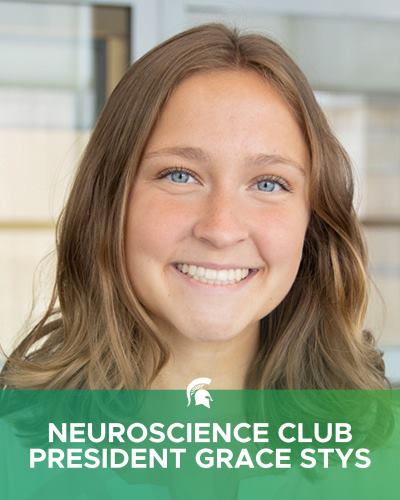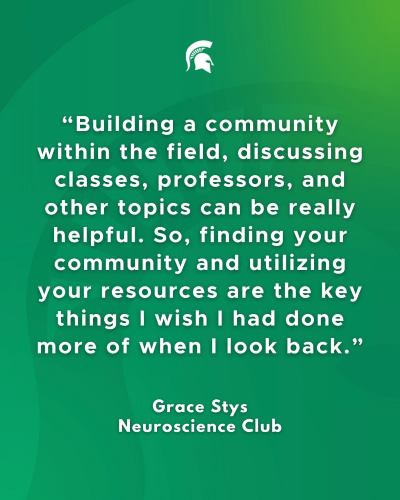A Conversation with Neuroscience Club President Grace Stys
September 18, 2024 - Shelly DeJong
 Grace Stys, a senior studying Psychology and Neuroscience, is the new president of the Neuroscience Club at Michigan State University. We chatted with Grace recently about why she’s involved with the Neuroscience Club, who the club might be a good fit for, and what she wishes she did more of as a first-year student.
Grace Stys, a senior studying Psychology and Neuroscience, is the new president of the Neuroscience Club at Michigan State University. We chatted with Grace recently about why she’s involved with the Neuroscience Club, who the club might be a good fit for, and what she wishes she did more of as a first-year student.
What has your experience been like as a double major in neuroscience and psychology?
When I got to Michigan State, I started taking neuroscience concentration classes and realized that many of them had connections to psychology. So, I decided to add a couple more psychology classes to get a deeper understanding of the subject. I've found the double major to be really beneficial—they align really well. I think it gives you extra depth into the behavioral aspect. Neuroscience can be very focused as a hard science, and the psychology aspect lets you see the whole picture as well.
Did you get started right away with the Neuroscience Club?
The Neuroscience Club was the first club that I joined when I came into college. I found it at Sparticipation, and it was the one that I stuck with. It's a cool group of people that are doing good things, so I’ve always been pretty active in it.
I originally started as a secretary because I wanted to have more involvement and connection with the group. Last year, I became the vice president, where I helped others with their positions. This year, I have taken on the role of president, and I am currently learning the responsibilities that come with it. My main focus now is ensuring everyone is collaborating effectively.
Tell us about the Neuroscience Club!
We meet every other Wednesday for one-hour meetings. We try to keep the club relatively low maintenance to make sure everyone has a chance to get involved. Each meeting is different - sometimes we talk about neuroscience topics like the neuroscience of love or fear, and other times we have career panels with med students, doctors, grad students, and industry professionals. We also focus on professional development activities like resume workshops and how to get a research position. We're trying to create a collaborative environment where everyone can find something they're interested in. We have fun and serious meetings, and overall, I think that everyone gets a lot of help from it.
Who do you think would be a good fit for the Neuroscience Club?
There are really two types of people who would be a good fit for the Neuroscience Club: those interested in neuroscience as a topic and those that are psychology or neuroscience majors. We have other majors that join, like computer science majors, and it's really cool to have them share their perspectives. Regardless of your major, it's beneficial to get involved early. Anyone who wants to become more involved in neuroscience, learn more about it, and seek guidance within the field is welcome to join our club.
This club is especially beneficial for incoming first year neuroscience or psychology who may not be sure of their direction. We have a new mentorship program where upper-class students get paired with first year and second year students so that they can have someone to talk to. Having a buddy in the club is helpful, especially for those who may be shy or find it challenging to engage with others. Having someone to talk to can make a big difference and can lead to building more connections within the club.
 Do you have any specific goals for this year for the club?
Do you have any specific goals for this year for the club?
The main aspects we're aiming to strengthen this year are professional development and the social/community aspects. We try to have a well-rounded approach with both a fun side and serious side. We're going to try to keep building up the social aspect of the club. I want to encourage more interaction and discussion among people. We want to ensure that everyone has a voice during meetings and that it's not just about observing. We've created forums to gather input—asking for feedback on what people want from the club. We want to give everyone a chance to talk and collaborate within neuroscience. Additionally, we're focusing on enhancing the professional development opportunities. It's been a gradual process of growth for the club over the past few years, and I'm excited about it.
When you were a first year student, what was helpful for you to know or do?
Talking with people in my classes or within clubs and asking them about the classes they found most beneficial and got the most out of was important to me. There are so many classes to choose from in psychology and neuroscience, and it can be overwhelming. Some people just pick classes based on their schedule, but I think it's important to talk to others and learn from their experiences. Connecting with people in your field is crucial, especially for incoming students. Building a community within the field, discussing classes, professors, and other topics can be really helpful. So, finding your community and utilizing your resources are the key things I wish I had done more of when I look back.
Any favorite classes that you’d recommend?
Dr Breedlove teaches a class every other year that is an intersection between neuroscience and psychology called “Psychology and Biology of Human Sexuality.” It was a very fun class, and he was an amazing professor. I hope that he keeps teaching for a long time. That was a great class for me and many of my peers. All of my psychology classes have been good experiences, too. I think that they all kind of build off of each other in a good way.
Do you have anything else that you want to add?
Try out whatever clubs that interest you. While I'd love for everyone to join the Neuroscience Club, it's important for you to get involved in something you enjoy. The most important thing is to find a group that you connect with.

